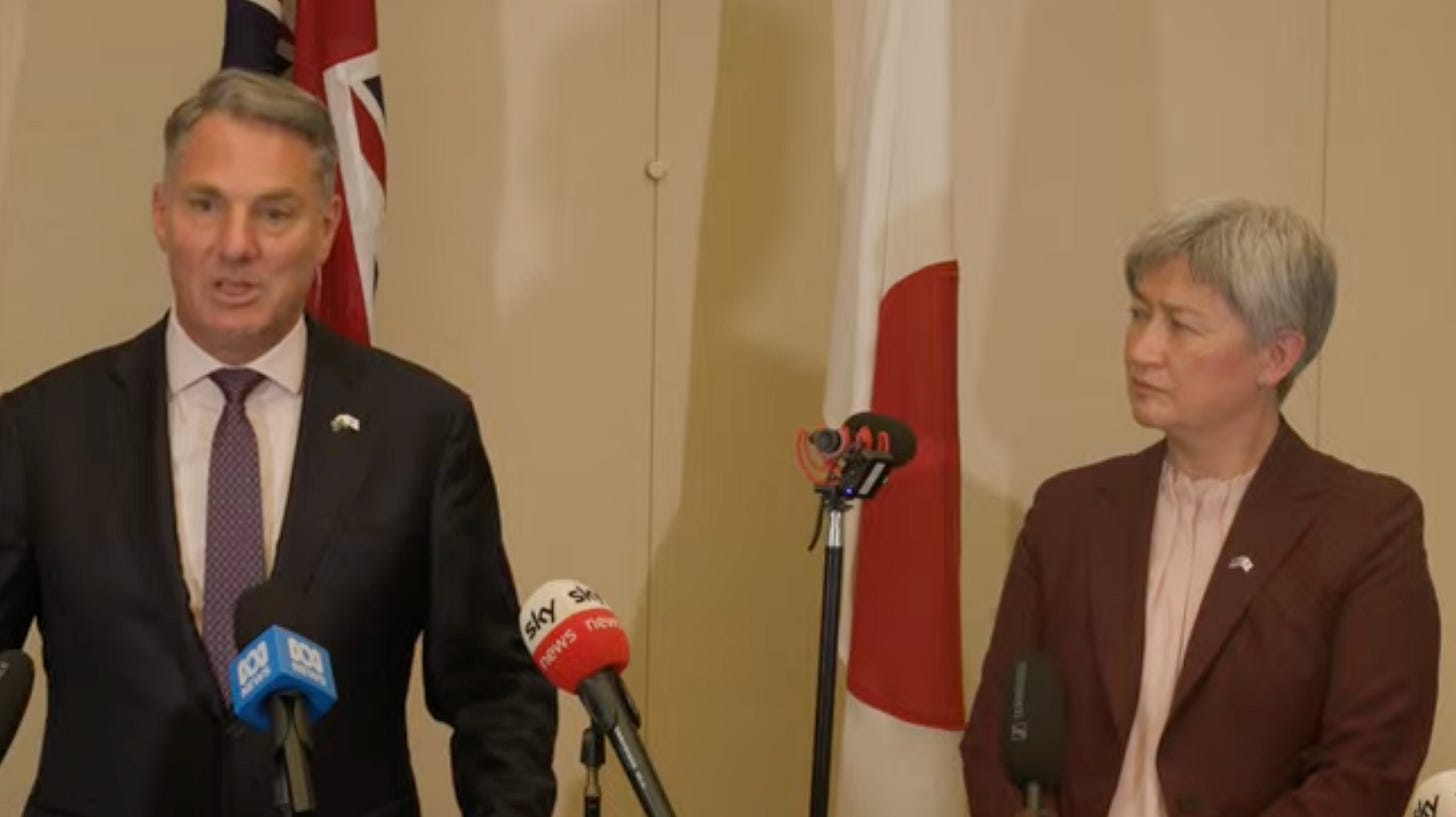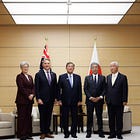Australia, Japan Expand Security Partnership With New Defense, Economic Agreements
Today’s email is brought to you by Empower your podcasting vision with a suite of creative solutions at your fingertips.
Australia and Japan have agreed to deepen their security and defense cooperation, announcing plans to elevate their special strategic partnership during high-level talks in Tokyo, where officials pledged to expand joint military exercises, bolster economic security, and stand firm against regional instability.
Deputy Prime Minister and Defence Minister Richard Marles and Foreign Minister Penny Wong met their Japanese counterparts Thursday for the 12th Australia–Japan Foreign and Defence Ministers’ Meeting, underscoring what both sides described as a “peak moment” in bilateral relations.
“The relationship is moving forward and today we have agreed to elevate the special strategic partnership between our two countries,” Marles said. “This is a really important step forward … in a way which will see us do more exercises, more operations, cooperate more in respect of logistics, cyber, and across all our domains”.
Truth matters. Quality journalism costs.
Your subscription to Mencari directly funds the investigative reporting our democracy needs. For less than a coffee per week, you enable our journalists to uncover stories that powerful interests would rather keep hidden. There is no corporate influence involved. No compromises. Just honest journalism when we need it most.
Not ready to be paid subscribe, but appreciate the newsletter ? Grab us a beer or snag the exclusive ad spot at the top of next week's newsletter.
Shared Concerns Over China, Russia, and North Korea
The talks took place against a backdrop of regional unease following China’s large-scale military parade on Sept. 3, which showcased new weapons and highlighted growing defense cooperation with Russia and North Korea.
“What we have seen … is a very significant display of Chinese military capability and we are also seeing a greater degree of cooperation between China and Russia and North Korea,” Wong said. “Our interest lies in ensuring that we are asserting the rules-based order and making our contribution to peace and stability of the Indo-Pacific”.
Wong emphasized Australia’s commitment to protecting critical sea lanes in the South China Sea and East China Sea, citing their importance to national trade. “Sea lines of communication are fundamentally important to us,” she said. “A growing proportion of our income is derived from trade and they are the most significant sea lines of communication that we have”.
The ministers jointly condemned unilateral attempts to change the status quo in disputed waters and reiterated their call for the complete denuclearisation of the Korean Peninsula. They also expressed “strong condemnation” of Russia’s war in Ukraine.
Mitsubishi’s Megami-Class Frigates Selected
A centerpiece of the discussions was Australia’s recent decision to select Mitsubishi Heavy Industries’ Mogami-class frigates as its future general-purpose warships, marking the most significant defense industrial collaboration between the two countries to date.
“We made this decision because this is the best frigate for Australia going forward, and this is the most cost-effective solution,” Marles said. He confirmed contract negotiations are expected to conclude in the first quarter of 2026, with the first vessel slated for delivery in 2029.
“This is really breaking new ground in terms of defence industry cooperation between Australia and Japan,” Marles said, noting both governments’ intent to move negotiations “forward quickly so that we are able to keep this on track”.
Wong added that Japan’s official backing for Mitsubishi’s bid gave Canberra confidence. “It mattered to Australia that … it was being put forward very much with the support of the Japanese government,” she said. “To know the Japanese government is standing there is deeply reassuring”.
AUKUS Under Review but “On Track”
Reporters pressed the ministers on whether the U.S. review of the AUKUS security pact under the Trump administration could slow Australia’s access to nuclear-powered submarines and advanced defense technologies.
“AUKUS is moving ahead at a pace. It is on schedule. And we are really confident about its progress,” Marles said. He noted reviews of the pact had already occurred in Britain and Australia, calling the U.S. process “a really good opportunity to look at how we can move forward more effectively, efficiently together as well”.
Japan, while not a member of AUKUS, has participated in exercises linked to the partnership. Marles pointed to Tokyo’s involvement in “Maritime Big Play,” a Talisman Sabre drill focused on autonomous undersea systems, as evidence of growing trilateral collaboration.
Expanding Economic Security and Supply Chains
Beyond defense hardware, both countries pledged to expand cooperation in economic security, with a focus on energy and critical minerals.
“The continued reliable supply from Australia to Japan and the continued long-term investment of Japan in Australia’s energy resources, particularly LNG, has been a crucial part of our relationship,” Wong said. “We want the next stage … to be our economic security in the area of critical minerals”.
Officials also agreed to work together on diversifying supply chains and building resilience against coercive trade practices. Wong highlighted ASEAN’s regional power grid as a shared priority, saying, “We are committed to working together to support ASEAN’s efforts to realise its objectives”.
Crisis Response and Civilian Evacuation
In a new step, Wong signed a memorandum of cooperation with Japanese Foreign Minister Yoko Kamikawa to strengthen joint efforts in evacuating nationals during crises, citing recent collaboration in New Caledonia.
“I’m very pleased that we are making sure this becomes a more formal practice,” Wong said, stressing the importance of readiness as regional instability persists.
Personal Diplomacy and Strategic Trust
Both Wong and Marles repeatedly underscored the personal trust between Australian and Japanese officials as critical to deepening the alliance. Wong noted she had visited Japan six times since becoming foreign minister, describing the discussions as “so close and so open, reflective of the values and trust that our two nations share”.
Marles said, “This is a moment where our bilateral relationship is really at a peak. We have never been doing more together than we are right now”.
Regional Dynamics: India, Quad, and Former Leaders
Asked about Indian Prime Minister Narendra Modi’s apparent closeness with Russian President Vladimir Putin and Chinese President Xi Jinping, Wong defended the Quad grouping of Australia, India, Japan, and the United States.
“India remains a very important partner for Australia … a critical partner for the stability of the region,” she said. “India remains a very important part of the Quad”.
She also distanced the government from former Victorian premier Daniel Andrews, who attended the Beijing parade. “I speak for Australia and for the Australian government. I don’t speak for private individuals,” Wong said. “But we all should be mindful of the message that our presence and engagement sends”.
The ministers closed the Tokyo summit with a pledge to accelerate defense industry negotiations, expand joint exercises, and broaden cooperation across economic and strategic domains. Both sides stressed their partnership was built not only on shared interests but also shared values.
“We know Australia and Japan face similar challenges. We know Australia and Japan share common interests. And we know now more than ever that we look to each other,” Wong said.
Got a News Tip?
Contact our editor via Proton Mail encrypted, X Direct Message, LinkedIn, or email. You can securely message him on Signal by using his username, Miko Santos.
Sustaining Mencari Requires Your Support
Independent journalism costs money. Help us continue delivering in-depth investigations and unfiltered commentary on the world's real stories. Your financial contribution enables thorough investigative work and thoughtful analysis, all supported by a dedicated community committed to accuracy and transparency.
Subscribe today to unlock our full archive of investigative reporting and fearless analysis. Subscribing to independent media outlets represents more than just information consumption—it embodies a commitment to factual reporting.
As well as knowing you’re keeping Mencari (Australia) alive, you’ll also get:
Get breaking news AS IT HAPPENS - Gain instant access to our real-time coverage and analysis when major stories break, keeping you ahead of the curve
Unlock our COMPLETE content library - Enjoy unlimited access to every newsletter, podcast episode, and exclusive archive—all seamlessly available in your favorite podcast apps.
Join the conversation that matters - Be part of our vibrant community with full commenting privileges on all content, directly supporting The Evening Post (Australia)
Catch up on some of Mencari’s recent stories:
It only takes a minute to help us investigate fearlessly and expose lies and wrongdoing to hold power accountable. Thanks!








